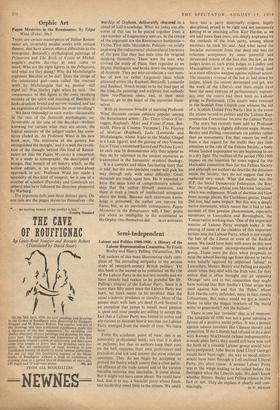Semi-Independent
Labour and Politics 1900-1906: A History of the Labour Representation Committee. By Frank
plain of 'the prevailing antipathy to the serious study of twentieth-century British politics.' Yet
this book is the second to be published on the rise of the Labour Party in the last two months and we have already had reason to. be grateful for Dr. Pelling's Origins of the Labour Party. Since it is more than fifty years since the Labour Party was born, no more seems to be involved than the usual academic prudence or timidity. Most of the people dealt with here are dead (Lord Samuel is an exception that jumps to mind), most passion is spent and most people are willing to accept the fact that a Labour Party was bound to arrive and are curious to discover how it was that our Labour Party emerged from the womb of time. We learn here.
From the academic point of view, this is an admirably professional book; not that it is drab or pedantic, but that its authors keep their eyes on the ball, suppress their own preferences and prejudices and ask and answer the most relevant questions. They do not begin by accepting as proved the theory which asserts that a close politi- cal alliance of the trade unions and of the various Socialist. societies was inevitable. It came about. But it might not have come about. We could have had, that is to say, a Socialist party whose funds and leadership owed little to the unions. We could
have had a party doctrinally exigent, highly disciplined, proud to be right and not necessarily aiming at or attaining office. Keir Hardie, as we are told more than once, was deeply impressed by the methods of the Irish party, among whose members he took his seat. And what saved the Socialist movement from that dead end was the reluctant acceptance by some powerful and threatened unions of the fact that the law, as the judges (even as such great judges as Lindley and Macnaghten) saw it, was capable of being used as a most effective weapon against militant action. The statutory reversal of the law as laid down by judges, which the unions demanded and got, was the work of the Liberals and there might have been the same exercise of parliamentary suprem- acy over the courts had there been no Labour group in Parliament. (The courts were reversed in the Scottish Free Church case without the aid of a Scottish United Free Party.) But in the event the unions turned to politics and the 'Labour Rep- resentation Committee' became the Labour Party.
The story has recently been told by Professor Poirier but from a slightly different angle. Messrs. Bealey and Pelling concentrate on politics rather than on movements. For that reason (as well as from a due regard for the truth) they pay little attention to the role of the Fabian Society, a body whose limited importance we are beginning to see in a dry light. The realities of the period 1900-1906 impose on the historian far more regard for the Methodist connexion than for the Fabian Society and although our authors do describe the divisions inside the Society, they do not suggest that they mattered very much. What did matter was the ILP, the Social Democratic Federation, the Boer War, the religious, ethical non-Marxian 'socialism' which was indigenous. Winds of doctrine did blow from strange places; the Caribbean genius, Daniel DeLeon, had some impact. But this was a deeply native movement, which meant that it had to take account of that genuine phenomenon, especially numerous in Lancashire and Birmingham, the 'Conservative working man.' One of the important sources of Labour Party strength today is the passing of most of the children of this important section into the Labour Party, which is not simply the heir of the Liberal or even of the Radical assets. We could have done with more on this now remote and almost incomprehensible political group. Those were the days when proposals to raise the school-leaving age from eleven to twelve were bitterly opposed by organised 'labour' in Lancashire. Messrs. Bealey and Pelling are equally astute when they deal with the Irish vote, for they notice that it often brought out an opposing 'Orange' vote and in this connection they might' have noticed that Bob Smillie's Ulster origin was used against him and that the 'Poles,' whom Keir Hardie nobly defended, were, in fact, mostly Lithuanians. But today could we get a- miners' leader to take the slogan 'workers of the world unite' so generously? Ask the Italians!
There is one last 'revision' that is of moment. The landslide of 1906 was not a great uprising in favour of a positive social policy. It was a protest against odious novelties like Chinese slavery and protection. If the Liberals had refused to do a deal with Ramsay MacDonald (whose indispensability is made plain here), they would still have won and the birth of a sizeable Labour group would have been postponed. John Burns (and Lloyd George) would have been right : the way to social reform would have been through a Left-inclined Liberal
Party. Dis aliter vision. A serious Labour Party
was in the wings waiting to be called before the footlights when the Liberals split. We don't know whether Messrs. Bealey and Pelling rejoice in this fact or not. They do explain it clearly and con-






























 Previous page
Previous page